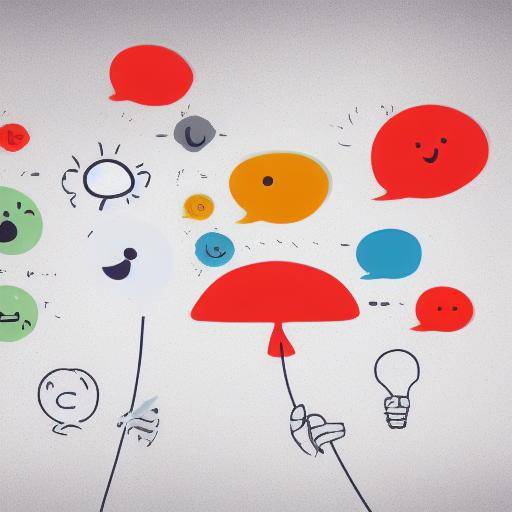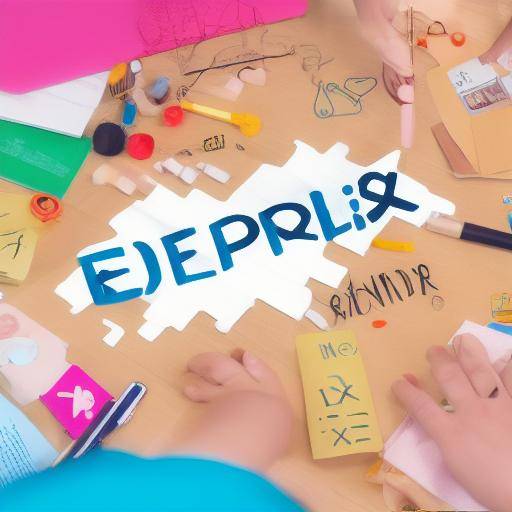
Introduction
Effective collaboration and teamwork are fundamental in the current working environment. However, to achieve optimal levels of performance, it is crucial to consider the role of emotional intelligence in these dynamics. In this article, we will explore in detail the importance of emotional intelligence in collaboration and teamwork, analyzing how this skill impacts on the productivity and success of companies. From its origins to its practical application, we will examine the evolution of these concepts, offering valuable insights and tips to maximize their potential in the working environment.
History and Background
Collaboration and teamwork have deep roots in the history of humanity. From the old concept of "community work" to modern business structures, collaboration has been a fundamental pillar in the evolution of societies and organizations. Throughout the centuries, collective ingenuity has promoted progress and innovation in different fields, leading to significant progress in various disciplines.
In parallel, emotional intelligence has become relevant as the positive effects of emotional management in the workplace are recognized. With milestones such as the publication of Daniel Goleman's book "Emotional Intelligence" in the mid-1990s, a greater understanding of the importance of emotions in labor performance and decision-making has been promoted.
Analysis in Deep
Emotional intelligence plays a vital role in collaboration and teamwork, as it allows professionals to understand and manage their own emotions, as well as to understand and respond effectively to the emotions of others. A working environment that fosters emotional intelligence among its members is often more cohesive, with open communication and greater willingness to resolve conflicts constructively. The ability to read the emotions of others and act accordingly results in an increase in empathy and mutual understanding among partners.
The integration of emotional intelligence into work teams not only improves the working climate, but also directly affects productivity. Effective management of emotions diminishes internal conflictivity and allows teams to focus on their common goals, promoting goals in a harmonious and cooperative working environment.
Comprehensive review
The practical application of emotional intelligence in collaboration and teamwork is essential for professional development and organizational success. Training partners in emotional skills strengthens decision-making, problem solving, and managing stress situations. It also promotes adaptive capacity and flexibility, essential pillars in dynamic working environments.
The benefits of adopting emotional intelligence in collaboration and teamwork are remarkable, but it is important to recognize that this process is not without challenges. The diversity of personalities and communication styles in a team requires a deep understanding and skillful management of emotions to ensure effective collaboration. Also, overcoming resistance to change and fostering an organizational culture based on emotional intelligence requires committed and proactive leadership.
Comparative analysis
The comparison between collaboration and emotional intelligence reveals that, while they are different concepts, they are complemented significantly. Collaboration focuses on joint work towards a shared goal, while emotional intelligence focuses on the recognition and effective management of emotions in this process. Productivity, in turn, is driven by the successful integration of both concepts, as a collaboration based on emotional intelligence tends to be more efficient and satisfactory to its participants.
Practical Tips and Accessible Recommendations
In order to promote emotional intelligence in collaboration and teamwork, it is crucial to establish training programs that provide partners with the tools necessary to understand and manage their emotions. These programs can include personal development activities, emotional coaching sessions, and practical workshops that promote empathy, assertiveness, and conflict resolution.
In addition, it is essential to promote participatory leadership that fosters a culture of openness, trust, and mutual respect. Leaders who recognize the importance of emotional intelligence in collaboration set a powerful example for their teams, fostering strong interpersonal relationships and a positive working climate.
Industry and Expert Reviews
According to studies conducted by leading experts in organizational psychology, such as Daniel Goleman and Travis Bradberry, emotional intelligence is a crucial predictor of success in the workplace. The development of emotional competencies correlates directly with outstanding work performance, healthy interpersonal relationships, and increased leadership capacity.
The influence of emotional intelligence on collaboration and teamwork has also been supported by industry leaders who highlight the importance of building working environments that value and nurture the emotional skills of their collaborators. Effective management of emotions is recognized as a strategic asset that drives innovation, creativity, and greater cohesion in the work teams.
Case Studies and Real Life Applications
Cases of success in leading companies in different industries demonstrate the positive impact of emotional intelligence on collaboration and teamwork. From software development teams to sales teams, the integration of emotional intelligence has led to significant improvements in productivity, quality of work, and job satisfaction. In highly collaborative environments, emotional skills strengthen connection and synergy among team members, enhancing creativity and effective problem solving.
Future Trends and Predictions
As organizations continue to prioritize effectiveness in collaboration and teamwork, the demand for emotional capacities is expected to continue to increase. It is anticipated that emotional intelligence will become an indispensable requirement for leaders and partners, and that their strategic integration into the working environment will be key to boosting innovation and competitive advantage in the global market.
Conclusion
In short, emotional intelligence plays an essential role in collaboration and teamwork, strongly affecting the productivity and success of organizations. By effectively understanding and managing emotions, teams can strengthen their relationships, optimize their performance, and face challenges constructively. Promoting emotional intelligence in the working environment is not only beneficial at the individual level, but also contributes significantly to the achievement of collective goals and the development of sound organizational cultures.
Frequently asked questions
**How is emotional intelligence implemented in a collaborative environment?**The implementation of emotional intelligence in a collaborative environment involves the formation of emotional skills among partners, the promotion of interpersonal empathy and understanding, and the promotion of leadership that values and exemplifies the effective management of emotions.
**What is the impact of emotional intelligence on team productivity?**Emotional intelligence contributes significantly to team productivity by reducing internal conflictivity, fostering effective communication and constructive conflict resolution, and promoting a positive working climate that enhances individual and collective performance.
**How can leaders promote emotional intelligence in their teams?**Leaders can promote emotional intelligence in their teams through training in emotional competencies, promoting a culture of openness and trust, and fostering open communication that values honesty and emotional expression.
**What long-term benefits brings with it the promotion of emotional intelligence in collaboration?**The promotion of emotional intelligence in collaboration can generate long-term benefits, such as a greater commitment from partners, a reduction in labour stress, a stronger organizational culture, and a sustained improvement in the productivity and performance of the team.
**How does the diversity of personalities influence the management of emotional intelligence in a work team?**The diversity of personalities in a work team demands deep understanding and effective management of emotions to ensure effective collaboration. Recognizing and assessing emotional diversity among team members is critical to fostering an inclusive and productive working environment.
**What is the role of emotional recognition in collaboration and teamwork?**Emotional recognition in collaboration and teamwork is crucial for building solid relationships and building mutual trust. The ability to understand and respond adequately to the emotions of others promotes a more empathic, cooperative, and responsive working environment to the diversity of thought.
**What are the best practices to integrate emotional intelligence into the decision-making process within a work team?**Integrating emotional intelligence into the decision-making process within a working team involves the conscious consideration of the emotions present in decision-making, the promotion of an atmosphere of openness and confidence to express emotions, and the systematic evaluation of the emotional implications of team decisions.
In conclusion, emotional intelligence plays a crucial role in collaboration and teamwork, and its impact on productivity and well-being is undeniable. By recognizing and nurturing the emotional skills of collaborators, organizations can strengthen their teams, boost innovation, and achieve higher levels of success both individually and collectively. The commitment to the development of emotional intelligence in the working environment represents a strategic investment in the present and future of companies, promoting a more humane, resilient, and effective working environment.






















































